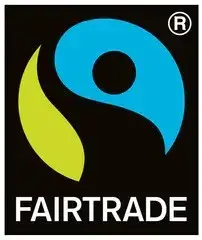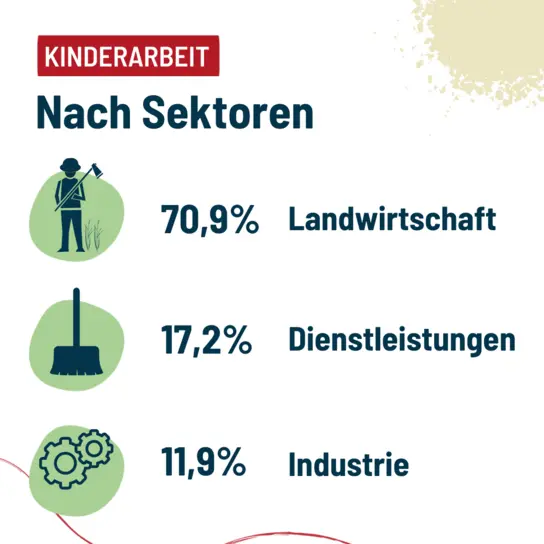Consumption without child labor:
Coffee, tea, cocoa and chocolate
Around 5.5 million farmers cultivate cocoa, and the demand for cocoa and chocolate is rising. Years ago, reports of child labor on cocoa plantations in West Africa prompted major manufacturers to implement anti-child labor programs. So far, these programs appear to have been ineffective. According to a new study by the NORC Institute at the University of Chicago, ten percent more children are working in Ivory Coast and Ghana today than in 2015. 1.48 million girls and boys cultivate cocoa and harvest the beans. Two-thirds of the cocoa consumed in Germany (in beverages and chocolate) comes from this region.
Eighty percent of coffee is grown by 25 million smallholder farmers. Most of them earn less than US$2 a day, just 10 cents above the poverty line as defined by the UN. Children work both on small farms and on coffee plantations. Child labor in coffee cultivation has been documented in Brazil, Costa Rica, Ivory Coast, Dominican Republic, El Salvador, Guatemala, Guinea, Honduras, Kenya, Colombia, Mexico, Nicaragua, Panama, Sierra Leone, Tanzania, Uganda, and Vietnam.
After water, tea is the most consumed beverage in the world, with 15,000 cups consumed every second. Unlike coffee and cocoa, tea is mostly grown on plantations. Just as with coffee and cocoa, however, tea pickers earn starvation wages and child labor is widespread. Furthermore, workers are often heavily dependent on the tea plantation owners, as they live on their land. Child labor has been documented in tea plantations in India, the world's second-largest tea producer after China, as well as in Kenya, Malawi, Myanmar, Rwanda, Sri Lanka, Tanzania, Uganda, and Vietnam.
Small-scale farmers and plantation workers are among the world's poorest, living just above the brink of absolute poverty despite their arduous work. Children in many families also work. Day laborers and migrant workers are particularly vulnerable to child labor. Parents often find work for only a few days and must frequently meet such high piecework rates that children are forced to work as well. Employers refuse to provide any social security, such as health or accident insurance. Families move from one job to the next. Migrant workers and their families are rarely registered at their places of work. As a result, farmers and communities do not feel responsible for, for example, providing healthcare or ensuring the children attend school.
Adults and children working in conventional agriculture are frequently exposed to toxins. Plants are sprayed several times per season without any protective measures for workers. Agriculture is a major driver of global biodiversity loss and responsible for about one-third of total greenhouse gas emissions . Unsustainable intensive agriculture, factory farming, and the conversion of forests into farmland (for example, for the cultivation of soy and palm oil) lead to massive ecological damage.
Fair Trade offers coffee, tea, cocoa, and chocolate. Approximately 70 percent of Fair Trade coffees, teas, and chocolates are also organically grown. Fair Trade supports small-scale farmers and plantation workers who adhere to fundamental labor rights and provide social security. Fair Trade goes beyond the social label.
Higher prices and a surcharge enable the payment of fairer wages and the development of vital infrastructure, such as health clinics and schools. In this way, Fair Trade has a twofold effect against child labor. Parents who earn enough don't have to send their children to work. And the auditors from the certification organizations ensure that employers also comply and do not employ children.
Fair trade products
Fairtrade International , the largest international fair trade association, reaches 1.66 million small-scale farmers and plantation workers in 1,400 producer organizations.
Fairtrade stands for:
- Prohibition of exploitative child labor and forced labor
- Compliance with core labor standards (freedom of association, freedom of negotiation)
- Occupational safety and social security
- Pre-financing of the harvest and stable minimum prices act as a safety net against price drops. When world market prices are higher, the higher price is paid.
- Payment of a Fairtrade premium for a community project of the cooperative or workers; promotion of sustainable farming practices and a premium for organic farming
- Supply chain transparency

Fairtrade coffee, tea, cocoa, chocolate, and sweets can be found in almost all supermarkets, organic and world shops, online stores, and delicatessens, and are offered in many cafes, coffee chains, bakeries, hotels, and canteens.
Here you can find Fairtrade products and Fairtrade retailers.
Other Fairtrade certifiers and traders:
- GEPA - The Fair Trade Company
- El Puente
- World Shop
- Fair for Life
- Ethiquable
- Naturland Fair
- Contigo
- WeltPartner eG
In some cities, initiatives sell fair trade coffee: in Hamburg, for example, Café Libertad Kollektiv eG and el-rojito . In Düsseldorf, Mocino , and in Berlin, oekotopia .
Rainforest Alliance
The green frog on the Rainforest Alliance represents sustainable agriculture and the preservation of biodiversity. The Rainforest Standard includes ecological and social criteria, including core labor standards (including the prohibition of child labor), integrated environmental management systems, and water and animal protection.


